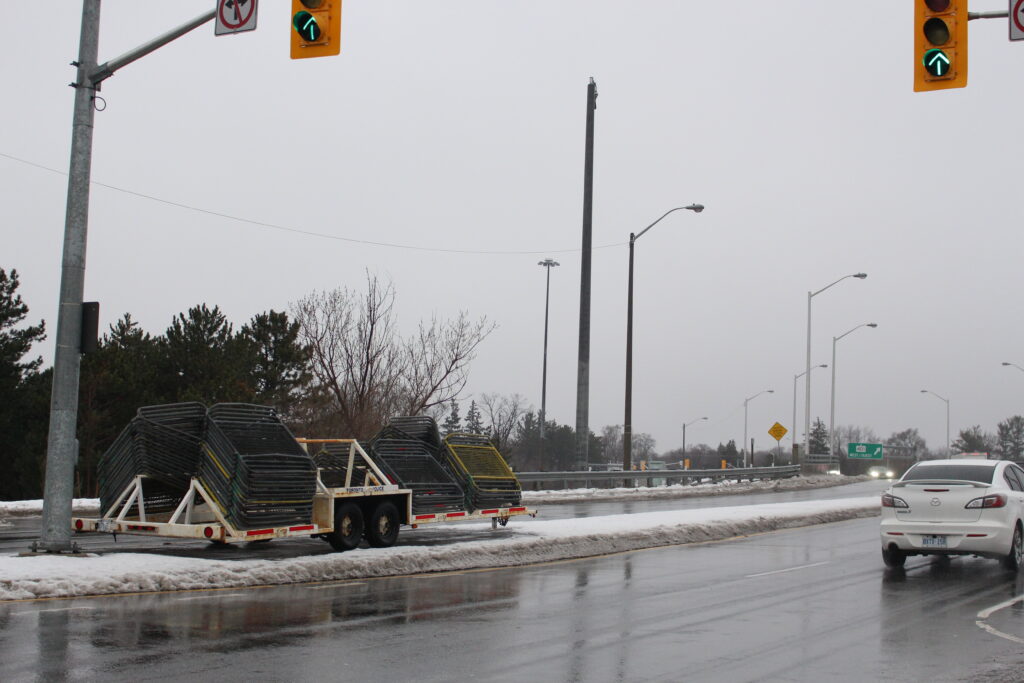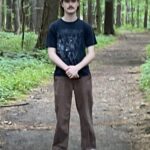
Listen to the full story:
On Friday, a judge ruled against a request for an injunction by B’nai Brith Canada, to prevent further protests at the Avenue Road overpass of Highway 401 in North York. Although the injunction was directed at pro-Palestinian protests, Toronto Police (TPS) have already banned all demonstrations at the site in question. The injunction would have extended the area 500 metres north and south of the overpass. However, Justice William Chalmers ruled that the injunction is moot given that it “will not have any practical effect and will not add anything to what the police are currently providing.”
Dozens of people filled the courtroom in Toronto’s Superior Court of Justice on Tuesday, many wearing Keffiyehs and other Palestinian symbols, to witness a hearing for the injunction. During the hearing, B’nai Brith, a Jewish human rights organization, argued the protests were “vitriolic” acts of intimidation directed at the Jewish community. Meanwhile, lawyers representing the protesters said B’nai Brith’s evidence consisted of hearsay and the discomfort of local residents did not justify an injunction. Furthermore, they alleged B’nai Brith has a political agenda that this injunction furthers. Beyond combating anti-Semitism, the organization is “a staunch defender of the State of Israel,” according to its website.
According to B’nai Brith’s argument, the protests were a public nuisance, but their lawyers did not include allegations of hate crimes or speech as a part of their motion despite alleging the protests left local Jewish residents concerned for their safety. The organization was speaking on behalf of those residents who had sent them complaints about the protests, which had been going on since Dec. 24.
During the protests, participants held signs, waved flags, dropped banners and used megaphones to spread their message. The large congregations of protesters and counter-protesters led to the overpass being closed several times. On Jan. 11, Chief of Police Myron Demkiw announced in a press conference that “moving forward, demonstrations or the congregation of individuals on the Avenue Road overpass will not be permitted. People can expect to be arrested if necessary.” B’nai Brith brought forth their injunction on the same day, before the TPS directive.
This announcement came after a push from a number of officials and organizations to address these protests, including the Centre for Israeli and Jewish Affairs (CIJA). “It’s been a real relief to people who live in the community to feel that they can walk outside and go about their daily business without fear of being screamed at, harassed, or possibly attacked by protesters,” said Jamie Kirzner-Roberts, GTA Vice President of CIJA, about the ban. CIJA released a statement calling for action on the protests on Jan. 9.
York Centre Councillor James Pasternak, whose riding borders the protest site, put forth a motion to the city council on Jan. 9 to consider “what enforcement measures the City of Toronto can take to keep the roadway free of protests and safe for pedestrians, cyclists and motorists.” In the past, Councillor Pasternak has been a vocal critic of pro-Palestinian activism. In December, he released a statement requesting the Toronto Public Library to cancel a talk from Norman Finkelstein, a controversial Jewish academic known for his criticisms of the state of Israel. Back in 2012, he attempted to halt the city’s funding for Pride Toronto over the use of the term “Israeli apartheid” by one participating group, Queers Against Israeli Apartheid. Pasternak was not available for comment on this story.
Eglinton-Lawrence MP Marco Mendicino, another supporter of the ban, reposted a call for a ban on X from Meir Weinstein, the former leader of the Jewish Defence League (JDL). The JDL is a designated terrorist group in the United States. According to Assia, a member of Eglinton-Lawrence and Don Valley for Palestine (ELDV4P) and an attendee of several of the protests, the number of counter-protesters increased after Weinstein’s post. ELDV4P is a group of local residents spreading awareness and advocating for political action on the conflict in Gaza. Some ELDV4P members participated in the protests, alongside other groups including Toronto for Palestine and Palesign (one of the defendants in the B’nai Brith injunction), but did not organize them.
On Jan. 13, three people were arrested and three more were allegedly injured by Toronto Police. The group there that day, including Assia, said they were not there to protest. “A group of us found out that a couple of people were going to be just walking on that bridge with no signs, no flags or anything. They were going to be walking there to assert their right to just walk across the bridge as visible minorities wearing Palestinian cultural attire,” said Assia.
The group alleged that police arrested individuals who questioned their actions and refused to explain why they were being arrested. Megan, another ELDV4P member who was present on the 13th, said racialized members of the group wearing Palestinian symbols were harassed while others were left alone. “It felt very much like the violence was racially targeted,” she said.
In response to these allegations, a TPS spokesperson said “Three individuals reported minor injuries, none of which involved any contact with police. Any suggestion that police used excessive force or caused injuries to demonstrators is false. Those who attempted to demonstrate on the overpass that day were given the opportunity to leave but refused, and were therefore arrested.”
The reasoning behind Pasternak’s motion, TPS’ ban, and B’nai Brith’s injunction overlap. They all say the protests threatened public safety. “The intention of the protests is to deliberately distract drivers” and “it is only a matter of time before there is a catastrophic accident with fatalities, injuries and property damage,” Pasternak said in his motion. However, ELDV4P said in a statement their demonstration “follows the model of similar 401 banner drops organized in solidarity with Ukraine – actions that raised no similar objections from the Toronto Police Service.”
These parties also allege that the protests target the large Jewish community in the area. As of 2016, four per cent of York Centre’s population was Jewish, which is higher than other neighborhoods in Toronto. “This is a residential neighbourhood,” said Kirzner-Roberts. “There is an old age community right there on the corner. There are dozens of synagogues and daycares within a one-block radius of there, this was causing all of these different communities and institutions to feel afraid to walk outside because of the hatefulness of the protesters and their message.”
ELDV4P has a “wide variety” of members, according to Megan. “We have Muslims and Hindus and Jewish people and secular people in our group, but we’re all from this neighbourhood,” she said.
TPS noted in their press release regarding the ban that anti-Semitic hate crimes doubled in 2023 from the previous year. There have been alleged incidents at the overpass of pro-Palestinian protesters telling counter-protesters to “go back” to their countries of origin.
According to a spokesperson for the Yonge Lawrence Village Business Improvement Area (BIA), near the protest site, no disruptions to their businesses due to the protests have been reported to the BIA group.
A spokesperson for TPS said in an emailed statement “we are always mindful of the constitutionally protected right to freedom of expression and peaceful assembly, however, we cannot allow activity that puts public safety at risk.”
“I’m wondering why we’re not getting any cops reaching out to us and asking how we’ve been feeling the last few weeks and about our safety. I also think it’s ironic that they claim it’s for the protection of the Jewish community because there were Jewish people who were walking with us,” said Assia. ELDV4P alleged that their members had been harassed and threatened by counter-protesters, including one woman who was arrested and charged for making a throat-cutting gesture on Dec. 24.
Ultimately, Megan said she believes this is a distraction from the issue at hand. “It is a real shame how much attention that this has taken away from the actual issue and the reason that we’re here. I mean, obviously, our civil rights are exceptionally important. But this isn’t even a conversation we should have to be having right, we should be able to focus 100 per cent on Palestine, on ending the siege in Gaza. That’s why we got together as a group, that’s our goal,” she said.
Editor’s Note: Assia and Megan’s surnames have been withheld for safety reasons.
Patrick Pearson is a fourth-year journalism student at Toronto Metropolitan University. He is also a contributor at The Modern Insurgent.

